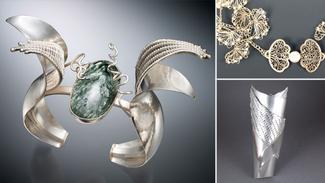Weaving With Wire
Create alluring surfaces and structures using woven metal techniques. This hands-on workshop will introduce students to twining, braiding, weaving, knitting, and soumak weaving. Students need not be experienced metal workers or weavers to acquire these textile skills, although manual dexterity is a must for this detailed work. The processes taught may be applied to jewelry, functional objects or sculpture — the sky's the limit!
You can see more of Munya's work on her website www.m-avigail-upin.com
Students should refrain from wearing fragrance (perfume, strongly scented lotion, etc.) to class.
Meet the instructor

Munya is a metalsmith and educator, living in Berkshires, Western Massachussets. Born in Faribault, Minnesota, she received a BFA from Drake University, an MA from San Diego State University, and an MFA from California State University, Fullerton. She was artist-in-residence at the Oregon College of Art and Craft and has taught at the University of Wisconsin, Madison; Southwest Texas State University, San Marcos, Texas; Penland School of Crafts; and the Massachusetts College of Art, just to name a few.
Munya employs skills generally associated with fibers and textiles in the making of original jewelry and sculpture, and she is regarded by many as an authority on combining metal and fiber techniques. Photographs of her work have appeared in Metalsmith, Niche, American Craft, and Arline Fisch's Textile Techniques in Metal. She is an award-winning metalsmith who has exhibited nationally and internationally for 45 years. Her exquisite metalwork is in private and public collections through the United States and Europe.
"The evolution of one's work is like a memoir in progress. Narrative work coexists with functional work and both say something about the maker. The work may depict one's childhood dreams, a circutious journey through life, or serve to enhance a ceremony. Whatever the statement or purpose, the work is genuine and revealing.
My work is represented by both sculptural and functional objects. The sculptures portray aspects of my life from childhood to adulthood. The pieces are about dreams, pain, surprises and realizations. Though the imagery ranges from non-representational to figurative, all the sculpture, in one way or another, documents my memories. The work is both evocative amd cathartic, and serves as my unwritten memoir.
The Jewish ceremonial pieces evolved out of a desire to create beautiful objects for weekly and yearly ritual celebrations. I am intrigued by the history of these objects as well as the challenge to design pieces for use in a contemporary setting. Most of the Judaica contains woven elements which create a uniquely rich, textural surface. These surfaces, combined with clean simple forms, express my design sensibilities and my attempts to make ritual objects that elevate the ceremony with which they are associated." - Munya
Materials & Tools
There is a required basic materials kit for this class. It includes the supplies you need to create samples of each weaving style. It is available to purchase from the instructor on the first day of class for an estimated $30.
Materials Kit Supplies include: ($30 - required)
- 16,18,20, 24 and 28 gauge copper wire
- Wooden dowels
- "macrame" work-boards
- Copper and brass foil
- Handouts
- Covered "hair bands"
- Single pointed scribers
- Earwires
- Jump rings
- Metal rulers
- Card-board bobbins
If students wish to work in silver, they should bring their own. Please contact us for assistance. Here is a suggested list:
- 1/2 oz. fine silver bezel wire - 3mm x 28 ga. Dead soft
- 1 oz. fine silver round wire - 24 ga. Dead soft
- Two- 1/2 oz. spools of 28 ga. fine silver round wire, dead soft.
- Please note: There will be extra spooling charge for the second spool.
- 1 oz. STERLING silver, round wire - 18 ga.
- OR you can order ALL these gauges and quantities in Argentium.
Other supplies will be available for purchase from the instructor, such as: wooden draw plates and colored copper wires (in a variety of gauges)
If Students have these, please bring them to the workshop:
- Wire cutters
- Scissors
- Optivisors (if needed)
- Flat or needle-nose pliers
- Masking tape

